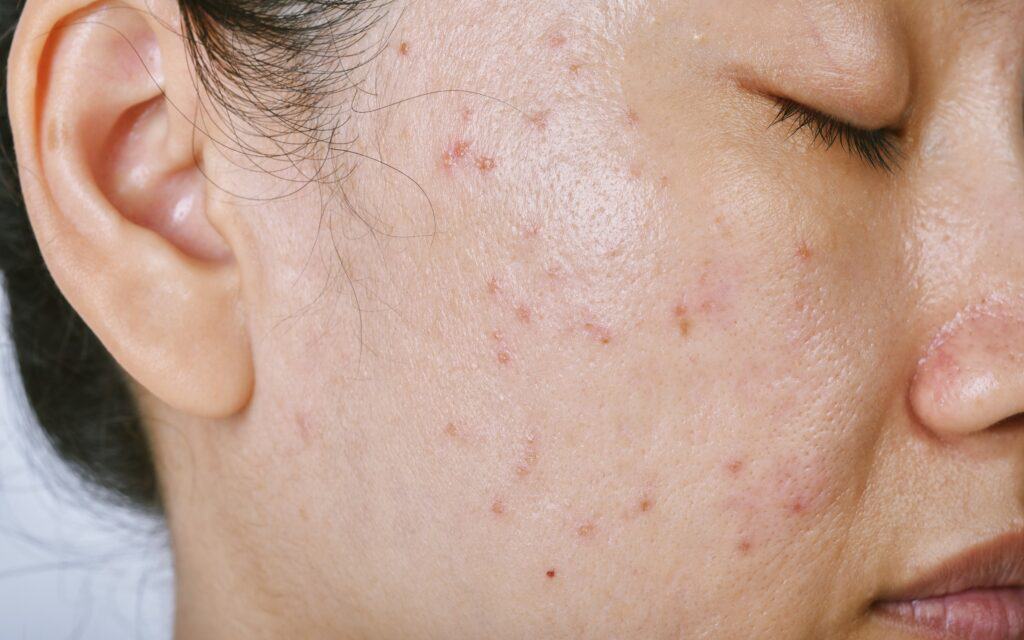Acne is a common skin condition affecting millions of individuals worldwide. Among the various types of acne, acne papules are one of the most prevalent forms. This article will provide an in-depth understanding of acne papules, exploring causes, effective treatments including at-home remedies and over-the-counter options, prevention strategies, and more.
What Are Acne Papules?
Acne papules are small, red, and inflamed bumps on the skin, typically not containing pus. They are a moderate form of acne and often develop from blackheads or whiteheads that become irritated or inflamed. Unlike other forms of acne, acne papules do not have visible centers of pus, making them distinct and challenging to treat.
Causes of Acne Papules
Several factors can contribute to the development of acne papules. They are typically caused by a combination of excess oil (sebum) production, dead skin cells, and bacteria. When your pores become blocked by excess sebum and dead skin cells, it can result in inflammation and the formation of a papule. Other factors like hormonal changes, diet, stress, and certain medications can also contribute to their occurrence.
Treating Acne Papules
There are various treatment options for acne papules, ranging from at-home remedies to over-the-counter products and medical interventions. However, it’s important to remember that what works for one person may not work for another, and treatment efficacy can vary depending on individual skin types and the severity of the condition.
At-Home Remedies
Some effective at-home remedies for acne papules include:
1.Tea Tree Oil: It has anti-inflammatory and antibacterial properties, which may help reduce inflammation and fight acne-causing bacteria.
2.Aloe Vera: Known for its soothing properties, aloe vera can help reduce inflammation and promote healing.
3.Green Tea Extract: The antioxidant and anti-inflammatory properties in green tea can help reduce the redness and inflammation associated with acne papules.
Over-the-Counter Options
Over-the-counter acne treatments are readily available and can be effective for moderate acne. Some common ingredients to look for include:
1.Benzoyl Peroxide: It kills bacteria and helps remove excess oil and dead skin cells, which can clog pores.
2.Salicylic Acid: This ingredient works by exfoliating the skin and unclogging the pores, thus preventing the formation of acne papules.
3.Retinoid creams: OTC retinoid creams are derivatives of vitamin A and work by promoting cell turnover and preventing the plugging of the hair follicle. An example is Differin (Adapalene).
4.Sulfur: Sulfur is an ingredient in some spot treatments and masks, which helps to dry out existing pimples and accelerate healing.
5.Alpha Hydroxy Acids (AHAs): AHAs, like glycolic acid and lactic acid, help to exfoliate the skin’s surface and prevent pore clogging.
6.Beta Hydroxy Acids (BHAs): Apart from salicylic acid, other BHAs like citric acid also work by exfoliating the skin and unclogging pores.
Always remember to follow the directions on the product label and start with a small amount to test your skin’s reaction.
Do’s and Don’ts for Acne Papules
Do’s
1.Maintain a regular skincare routine: Consistency is key when it comes to managing acne. Ensure to cleanse, tone, and moisturize your skin daily.
2.Do use non-comedogenic products: These products are designed not to clog pores, which can help prevent acne papules.
3.Do stay hydrated: Drinking plenty of water can help keep your skin hydrated and may assist in managing acne.
4.Do protect your skin from the sun: Excessive sun exposure can cause inflammation and potentially worsen acne. Use a non-comedogenic sunscreen to protect your skin.
5.Do change pillowcases regularly: Pillowcases can harbor dirt and oil, which could contribute to acne. Changing them regularly can help prevent acne papules.
Don’ts
1.Don’t squeeze or pick at your acne: This can lead to scarring and might even worsen your acne.
2.Don’t over-wash your face: Over-washing can strip your skin of natural oils and may lead to increased sebum production, causing more acne.
3.Don’t use harsh facial scrubs: Over-exfoliating with harsh scrubs can irritate your skin and possibly worsen acne papules.
4.Don’t touch your face frequently: Touching your face can spread bacteria and oil, leading to more acne.
5.Don’t use oil-based makeup: Oil-based makeup can clog pores and lead to acne. Opt for non-comedogenic makeup products instead.
Preventing Acne Papules
Preventing acne papules primarily involves maintaining good skincare habits. Here are some prevention tips:
1.Regular cleansing: Cleanse your face twice daily to remove excess oil, dirt, and dead skin cells.
2.Healthy diet: Certain foods might trigger acne in some people. Maintaining a balanced diet rich in fruits, vegetables, lean proteins, and whole grains can promote healthy skin.
3.Stress management: High stress levels can contribute to acne. Implementing stress management techniques, such as yoga, meditation, or exercise, can potentially reduce acne breakouts.
The Takeaway
Understanding acne papules and their causes can help you make more informed decisions about your skincare. With the right combination of at-home treatments, over-the-counter products, and healthy habits, managing and preventing acne papules is achievable. As always, for severe or persistent acne, seek the advice of a dermatologist. They can provide specialized advice and treatment options tailored to your specific needs.
Remember, every skin is unique, and the journey to clear skin can be a process of trial and error. Keep exploring, stay patient, and you will find what works best for you in managing acne papules.
